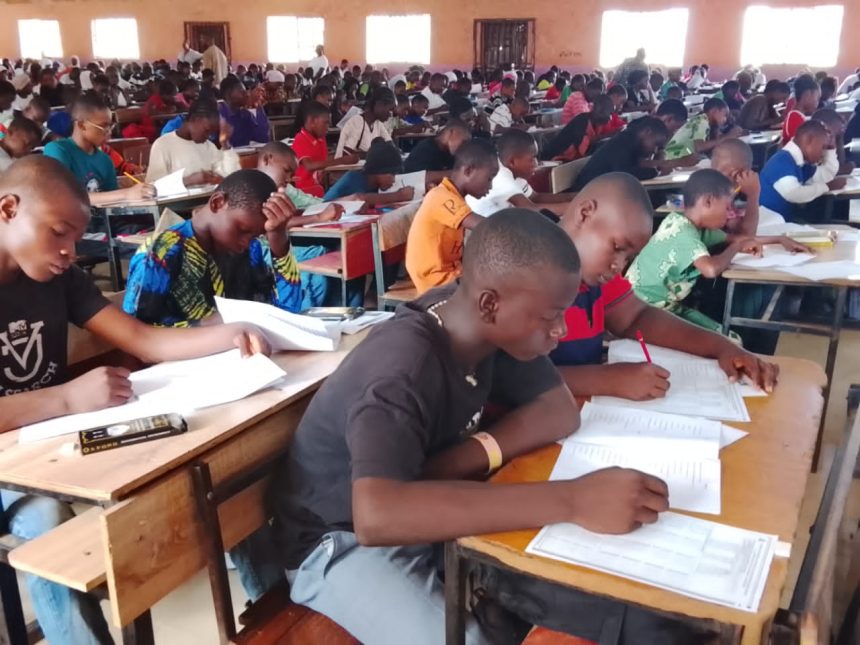The Federal Government has flagged off the 2025 entrance examination for Technical and Vocational Education and Training (TVET) into Federal Technical Colleges across Nigeria, with over 30,000 candidates participating in the exercise nationwide.
The examination is being conducted by the National Business and Technical Examinations Board (NABTEB).
The Registrar and Chief Executive Officer of NABTEB, Dr Mohammed Aminu Mohammed, who monitored the exercise, said adequate arrangements have been made to ensure a smooth and seamless examination.
He spoke while monitoring the examination at the Federal Technical College, Orozo, Abuja, on Saturday.
Recall that the Federal Government had recently announced free tuition, accommodation, and feeding for students in Federal and State Technical Colleges as part of the TVET programme.
The students would also receive a monthly stipend of ₦22,500. This initiative aims to boost TVET participation and equip Nigerian youth with practical, industry-relevant skills.
The announcement was made by the Minister of Education, Tunji Alausa, during the launch of the TVET programme in Abuja. The programme is designed to attract more young people to technical and vocational education, providing them with skills for employability and aligning the education system with the needs of the Nigerian economy.
Speaking during monitoring of the entrance examination, the Registrar of NABTEB, Dr Mohammed, described it as a beautiful and exciting federal government project, saying that the aim is to equip Nigerian youth with industry-relevant skills while reshaping the country’s approach to human capital development.
He emphasised that the examination is not just a means of selecting students but also a strategic tool for determining individual strengths and aligning them with specific trades.
“If you pass, we will look at your skill and study your score. We have already collected certain data from each candidate, and that will help us determine whether they are suited for electrical installation, tailoring, solar maintenance, or other vocational areas.”
He further noted that the significance of the programme lies in its potential to reverse Nigeria’s overdependence on imported skills and products.
“No nation succeeds economically without artisans, craftsmen, and technicians. They are the backbone of any country’s GDP. The era of paper qualifications is gradually phasing out. We are now in the era of ‘what can you offer?’”
The NABTEB boss lamented the prevailing trend where simple construction jobs, such as tiling and POP installations, are outsourced to foreign nationals, even though Nigerian youth possess the energy and potential to perform the same tasks if properly trained and certified.
“Being in the building industry is big business. With initiatives like this, our young people will soon be able to take back these roles and earn a decent living.”
He revealed that the government’s plan includes creating an enabling environment for certified technical talents to practise and thrive locally. He cited major national projects, such as the gas pipeline initiative, which would soon rely heavily on indigenous artisans and technicians.
“But the question is, are they certified? That’s why this programme is critical. Certification builds trust. No one wants to risk their resources on unverified skills.”
He said as part of the TVET programme, students will undergo training of varying durations — six months, nine months, or one year — depending on their chosen trade. Upon completion, he said they will be provided with starter packs and possible access to business loans.
“This is not just about skills acquisition. It’s about job creation and economic empowerment. Those who complete the programme can either be employed by the government or set up their own businesses with the support structures being put in place.”
Mohammed assured that adequate planning is in place to absorb the expected influx into the technical colleges, noting that a selection committee comprising principals of federal technical colleges, NABTEB officials, and representatives from the Ministry of Education will oversee the admission process.
“In 21 days, we hope to release the results. Only then will we be able to determine how many candidates will proceed to the next stage. It’s too early to say now, but our belief is that by this time next year, this paper-based process will become fully digitised.”
ALSO READ TOP STORIES FROM NIGERIAN TRIBUNE
WATCH TOP VIDEOS FROM NIGERIAN TRIBUNE TV
- Relationship Hangout: Public vs Private Proposals – Which Truly Wins in Love?
- “No” Is a Complete Sentence: Why You Should Stop Feeling Guilty
- Relationship Hangout: Friendship Talk 2025 – How to Be a Good Friend & Big Questions on Friendship
- Police Overpower Armed Robbers in Ibadan After Fierce Struggle






